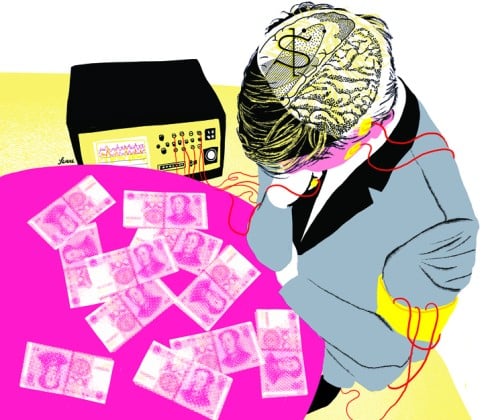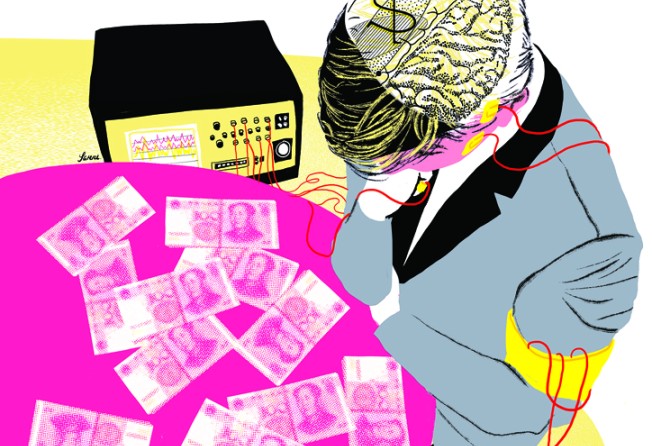
Is corruption all in the mind?
Mainland research suggests that graft may have a physiological basis, and that some people's brains are hard-wired for bribery


Mainland scientists say the answer might lie in part of the left brain, prompting debate over whether drugs or therapy could fight the tendency for corruption.
Science has long searched for a neural mechanism that might explain why people deviate from social norms of behaviour.
One recent study by mainland behavioural neuroscientists focused on a small region of the brain located slightly above the temple called the left inferior frontal gyrus.
It was found to play a "critical role" when "people prefer to pursue wealth at the expense of moral goodness", they wrote in a paper published in May in the international journal Frontiers in Behavioural Neuroscience.
The team, led by Professor Li Shu from the Institute of Psychology at the Chinese Academy of Sciences, found brain stimulation that came from accepting bribes increased with the amount of money involved.
The researchers devised a game for 28 volunteers. Each was offered gradually increasing amounts of money from eight yuan (HK$10) to 3,000 yuan.
With each offer, they were asked if they would like to split the money with others, in which case they would get a percentage, or if they would refuse the entire amount, in which case nobody would get anything.
"It is similar to the situation of an offer of a bribe and accepting it," Li said.
The volunteers were placed inside an MRI machine and their brain activity recorded.
They were asked about taking a kickback and answered by pressing a button for "yes" or "no". Researchers discovered a cash offer, regardless of the amount, would stimulate the "feel good" areas of the brain: the right lateral prefrontal cortex and the bilateral insular cortices, which are at the front and sides of the brain respectively.
When volunteers decided to accept a percentage of the money, their left inferior frontal gyrus was activated more intensely than in other regions. The higher the amount of money, the more activity seen in the gyrus.
Not all of the participants responded the same way to a high-stakes offer. People with more active gyrus had a stronger tendency to sacrifice fairness for money - in other words, they were more easily "bribed".
"The results can shed new light on the question of why and how corruption occurs," said Li.
Dr Ge Jianqiao, a neurologist at the Academy for Advanced Interdisciplinary Studies at Peking University, said studying the brain functions of corrupt officials could uncover a physical link to the behaviour.
"It's an intriguing topic for scientists and important to society," Ge said.
The mainland is in the midst of one of the most extensive crackdowns against official corruption since the People's Republic was founded in 1949.
More than 30,000 government officials have been prosecuted for taking bribes since President Xi Jinping launched his anti-graft campaign in late 2012, according to government figures
However, Ge acknowledged that scanning the brains of convicted bribe-takers faced numerous technical challenges. To make a comparison, researchers would first need to establish a model of a "normal brain".
Who should corrupt officials then be compared with - ordinary citizens or other government officials who face the same work pressure?
Corruption could also be influenced by several social and biological factors, such as financial status and health, Ge added.
But if bribe-taking was found to have a physical correlation in the brain, scientists could look at alternative ways to modify behaviour, including medication or psychotherapy, she said.
Dr Cao Jun, a neuroscience researcher at the academy's Kunming Institute of Zoology, warned that any study would require not only the subject's consent, but also approval from the government. "The biggest challenge to such a study will not be scientific, but political," he said.
"Without authorisation, no scientist will be allowed to scan the brains of former government officials in jail. Unless a decision is made by government leaders at the highest level, no scientific institute would dare fund or even approve the project," Cao said.
People convicted of corruption may also be unwilling to help research, he said. "While corrupt officials are hated by everybody, they are human beings," he said. "We can't probe their brains without their consent."